What are the types of adrenal tumors?

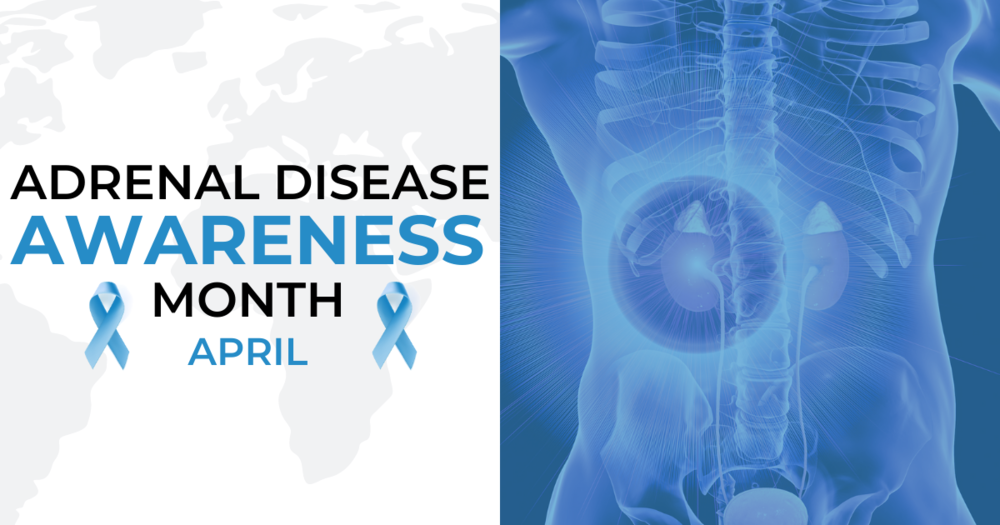
April is Adrenal disease awareness month. We surely need an adrenal awareness month because there is a significant lack of understanding about adrenal disease, type of adrenal tumors, and their treatment.
INTRODUCTION
Various adrenal tumor types are common. (A tumor simply means a mass. Tumors can be either benign or malignant; cancer). In fact, the vast majority of adrenal tumor types are benign, meaning not cancerous. The older we get the more likely we are to develop an adrenal tumor. In a 20-year-old only about 0.2% of all individuals have an adrenal tumor whereas when we get to 70 years old almost 7% have an in an adrenal tumor. It also means that an adrenal tumor in young people (< 50 years of age) are often significant and more likely to need surgery.
What are the types of adrenal tumors?
Some adrenal tumor types overproduce hormones. These tumors always need to be removed because the adrenal hormones in your body are too high, causing toxic effects to your body. Too much adrenal hormones such as aldosterone, cortisol, and catecholamines (epinephrine; adrenaline) can create very damaging effects on the body over the long-term. We call these tumors “functioning” or “endocrine-active”. Aldosterone producing adrenocortical tumors cause primary hyperaldosteronism, whereas cortisol producing adrenocortical tumors cause primary hypercortisolism or Cushing’s syndrome. Catecholamine- (epinephrine; adrenaline) producing adrenal tumors cause pheochromocytoma. Any functioning tumor type should be removed by surgery (adrenalectomy). Fortunately, most of them are benign, and can be cured with adrenal surgery (adrenal gland removal), including using the best operation: Mini Back Scope Adrenalectomy (MBSA).
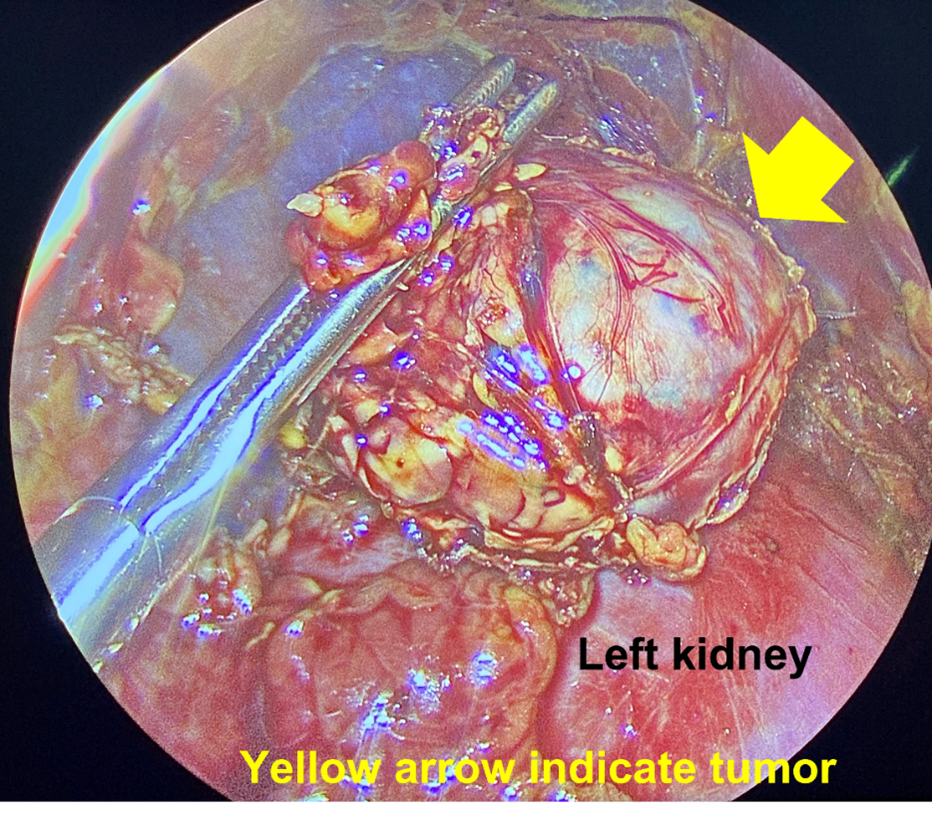
Figure 1. Intraoperative photo of a 3 cm left pheochromocytoma (arrow) in a 12-year-old boy. Dr. Carling removed the tumor using the Mini Back Scope Adrenalectomy (MBSA) in less than 20 minutes.
ADRENAL TUMOR TYPE CLASSIFICATION
Adrenal tumor types can be classified based on which cell type they arise from. Broadly there are 4 major groups: adrenal medullary tumors, adrenal cortical tumors, adrenal metastasis and other adrenal tumors.
Table 1. Classification of adrenal tumors based on cell origin.
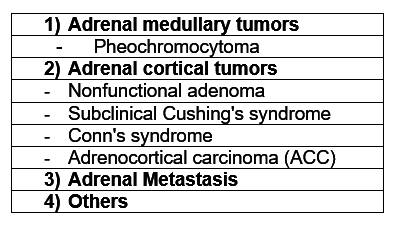
TYPES OF ADRENAL TUMORS AND INCIDENTALOMA
The definition of an adrenal incidentaloma (sometimes termed adrenal mass, or nodule) is an adrenal tumor type that is discovered when a radiological (X-ray) study is performed for indications other than for adrenal disease. This definition excludes patients undergoing imaging studies as part of a known cancer elsewhere (for instance, lung, breast, kidney, melanoma).
As stated, adrenal incidentalomas are common, and become more common as we age. In autopsy studies about 6 % of all individuals have an adrenal mass. Using CT scanning, one may identify adrenal masses in about 4 % of patients. Again, most of these masses are:
- not cancerous
- not overproducing hormones
In patients with an underlying other cancer (most commonly carcinomas of the lung, breast, kidney, and melanoma), up to three fourths of incidentalomas are adrenal metastases (spread). In contrast, the lack of a primary cancer site in a patient with an adrenal incidentaloma would make the diagnosis of a metastatic lesion very unlikely. This is important to know. If you do not have a known other cancer, it is very unlikely that the adrenal mass is spread (metastasis) from another cancer.
When clinicians face an adrenal incidentaloma, there are mainly three questions that need to be answered:
- Is it truly arising from the adrenal? This is usually easy to tell based on the CT or MRI scan. However, there are some rare retroperitoneal lesions that may be adjacent but not arising from the adrenal gland, per se. You can read about these rare lesions here.
- Is the tumor type a cancer (malignant), and if so, is it a primary or a metastatic tumor?
- is it functional (overproducing hormones)? Patients with all adrenal tumor types should undergo a thorough clinical evaluation. The history and physical exam should be aimed at excluding a functional tumor type or an underlying malignant disease.
Table 2. The prevalence (%) of some of the common underlying etiologies in patients with different types of adrenal tumors
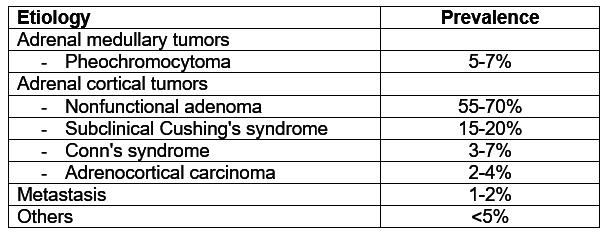
HOW TO DIAGNOSE DIFFERENT TYPES OF ADRENAL TUMORS?
Patients with an adrenal tumor should undergo a thorough clinical evaluation. The history and physical exam by the doctor should be aimed at identifying a functional tumor or an underlying malignant disease. The signs and symptoms of the patient is directly linked to the adrenal tumor type.
TABLE 3. Common symptoms and signs in different types of adrenal tumors.
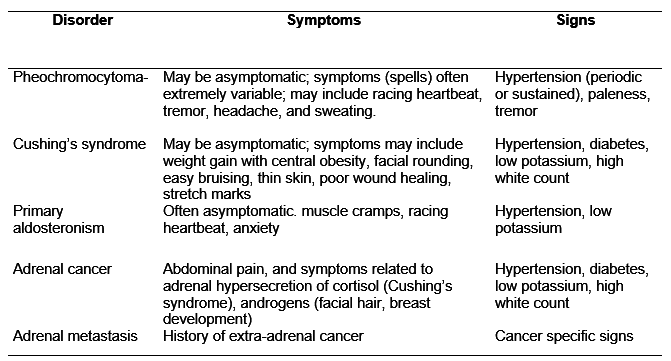
Please note this is not a complete list of symptoms. There are many more symptoms of adrenal tumor types!
Read more:
- Symptoms of primary hypercortisolism or Cushing’s syndrome
- Symptoms of pheochromocytoma
- Symptoms of primary hyperaldosteronism
- Symptoms of adrenal cancer
LAB TESTING FOR DIFFERENT TYPES OF ADRENAL TUMORS
After performing a very careful interview with the patient to see if they have any symptoms as outlined above, the next step is to perform laboratory testing to see if the adrenal tumor is over producing any hormones. This is exceedingly important. This topic tends to confuse both patients and physicians. The reason is that not many doctors have significant experience with obtaining and interpreting laboratory values when it comes to adrenal hormones. The laboratory evaluation includes both urinary tests as well as blood tests. There are laboratory tests that are first done to screen for pheochromocytoma, Cushing’s syndrome and primary hyperaldosteronism (Conn’s syndrome). Sometimes these laboratory tests are unequivocal (i.e. the diagnosis is a slam dunk), and the patient can go straight to curative surgery.
Sometimes, however, these laboratory tests are borderline or difficult to interpret because of interference by medications. You can always contact us for us to review laboratory tests.
This is all we do. For us it is very easy to evaluate laboratory testing since we have seen hundreds to thousands of adrenal patients. Sometimes when the laboratory tests are borderline, they have to be repeated. In addition, there are some confirmatory test that needs to be performed.
For a detailed discussion of laboratory (both blood, urine, and other tests) evaluation of each type go to the individual pages of Pheochromocytoma, Cushing’s syndrome, Primary hyperaldosteronism (Conn’s syndrome), and Adrenocortical cancer.
- Pheochromocytoma diagnosis and lab testing
- Cushing's syndrome diagnosis and lab testing
- Conn's syndrome diagnosis and lab testing
Dr. Tobias Carling, of the Carling Adrenal Center, is one of the world's leading experts in adrenal gland surgery. Dr. Carling performs more adrenal operations than any other surgeon in America. Dr. Carling left Yale University in 2020 to open the Carling Adrenal Center in Tampa, Florida.
To discuss the details of your case with Dr. Carling and become his patient, fill out the new patient form and he will be in touch with you shortly.
Additional Resources:
- Learn more about the Carling Adrenal Center
- Learn more about Dr. Tobias Carling
- Learn more about our sister surgeons at the Norman Parathyroid Center, Clayman Thyroid Center and Scarless Thyroid Surgery Center
- Learn more about the Hospital for Endocrine Surgery